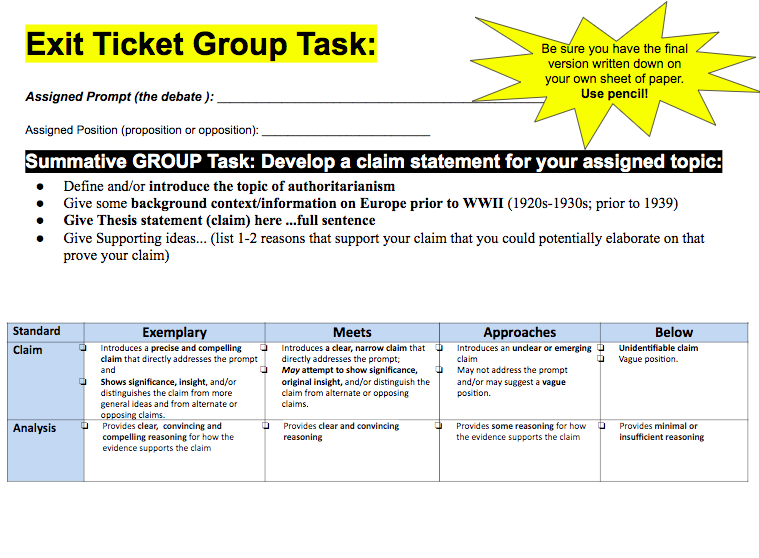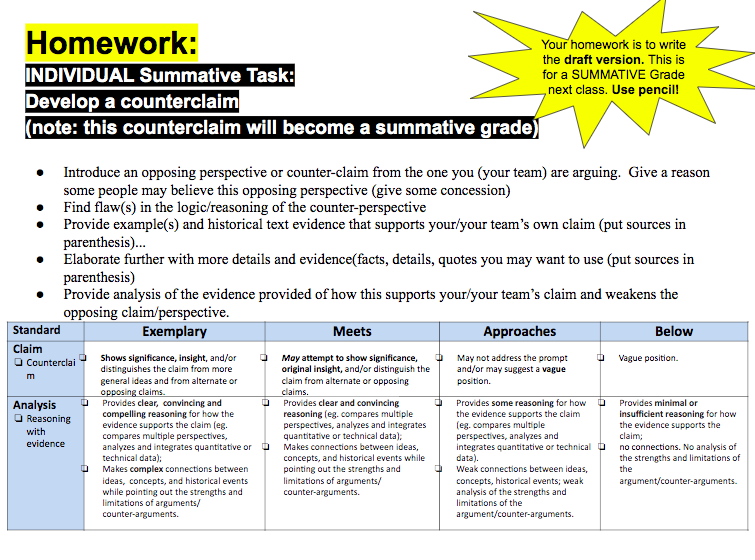Day 1: Work with your group to take notes.Today, your task is to begin working with your group to take notes and find evidence that will help support the position your team has been assigned to. Step 1: Create a group shared document. You will use this document to collectively add notes and evidence that helps support your position. Use the same strategy as you did with your formative debate group and formative speech group-- use a strategy such as creating a table, using color-coding, etc. to differentiate where within the document each person is contributing notes and to help track and hold each member accountable for contributing notes. Use the DBQ packets Jigsaw this out-- assign each team member a different job or section of the DBQ to take notes from. Divide and conquer! Resources to help you research your assigned topic:DBQ Packets for your Team’s Research:
Topic-Specific Videos: (note: Some of these are credible, reliable sources and others are less scholarly and credible. Use good judgement in which additional sources you use for building your background information vs. using for a source for evidence) Rise of Authoritarianism - Pre-World War II
Rise of Communism in Russia:
Rise of Nazism in Germany:
Rise of Fascism in Japan:
You are welcome to do your own additional research and use sources you find on your own. Please be sure to use CREDIBLE/SCHOLARLY sources (e.g., ABC-CLIO, Encyclopedia Britannica, published government documents, primary sources, etc.). Do not use non-scholarly sources for your evidence in your counterclaim or in your speech (e.g. History.com, Crash Course videos, Ducksters, AlphaHistory, Quora, Wikipedia, etc.)  Step 2: Develop a claim statement. Towards the end of class, your team members will need to draft a claim statement. Start with drafting this on the dry-erase board. After you have a claim statement + reasons that you all agree upon, it will be important to record this on the handout (salmon colored paper handout) so that you can refer to it when you need to draft a counterclaim statement for homework. Note: The group claim statement is not for a grade but will be what you will most likely be using in your speech so it does matter. It will be the job of whomever is assigned as the Opening Speaker to make the claim stronger and add the introduction and further reasoning and evidence. The group does not need to do anything more than draft the agreed upon claim statement and reasons (no evidence needed yet). HW: Develop a Counterclaim StatementUse the handout provided to draft your counterclaim. Use the following document if you lost your copy of the handout: Please note the claim is something you will develop as a group. This is NOT scored for a summative grade. You are however expected to INDIVIDUALLY develop a counterclaim. This counterclaim will be graded. This task is individual work--not group work. It is due at the start of next class. You will have an opportunity for feedback and then you will resubmit it for a SUMMATIVE score. Exemplars to help you with this summative task: Comments are closed.
|
Mrs. Stewart's CourseYou'll find a daily agenda posted here for each day that class meets Archives
May 2020
Categories |

 RSS Feed
RSS Feed